Do you struggle with your freelance writing career?
You are not alone. Anybody who writes for a living faces challenges on a regular basis, both in their writing and in their freelance business.
It’s not a matter of why you have them, but how you can overcome them.
That’s what this article is all about.
I have taken three of the most common writing challenges freelance writers face and how you can solve them one by one.
I hope that by the end of this article, you will stop worrying about these writing struggles and focus on applying them every time they come up.
I Feel Like an Impostor
Have you ever deleted a sentence shortly after you have written it because you felt you weren’t knowledgeable enough to write it?
I’m sure you have. C’mon, I’ve done it more times than I can count it, so there’s no shame in accepting it.
The who-am-I-to-write-this feeling is called “impostor syndrome.”
If you write about technical or advanced topics which you aren’t experienced in, you may be right to think that you need to learn more before you write something.
That’s called research, and all writers must do it before writing a piece.
But doubting yourself every time you write a word, thinking that you need to know everything about a topic to write about it is nonsense. It’s useless self-doubt.
You think you need to be an expert to write, except that you don’t.
Malcolm Gladwell isn’t a psychologist, and yet he broke Blink.
Matt Ridley isn’t a geneticist, and yet he wrote Genome.
Nicholas Nassim Taleb isn’t a philosopher, yet he wrote Skin in the Game.
None of them were experts in the topics of their books, yet they wrote them anyway. And they are incredible pieces of writing.
Your mindset is limiting your writing before you are done with it.
And you can’t let that happen.
Solution: Shift Your Mindset
You suffer from impostor syndrome because you think that you have to be an expert to write about a topic.
But your readers don’t need an expert writing about a topic. They don’t care either.
All they want is the information to learn about something and move on with their lives.
All you need is to know more than your reader.
This means two things:
- You need to know how much your readers know about your topic.
- You need to know how much expertise writing your topic requires.
The less the reader knows, the easier it will be for you to write the content. Your content will be focused on explaining what you learn from your research. If you don’t know what you are writing about, beginner-friendly content will help you overcome your impostor syndrome faster.
But while some topics can be geared towards beginners, it doesn’t mean it will be easy to approach. Some topics are intrinsically technical and complex. Think anything about medicine, health, law, finances, and engineering.
Even if you had to explain what HTML is—a basic topic on web development—you still need to understand the difference between front-end and back-end, what purpose HTML serves on a website, how it “communicates” with other languages, and more.
Your mindset shift towards expertise still needs to be based on knowledge. Rehashing other people’s content will keep you in the pennies-per-word rate forever.
- Familiarize yourself with the jargon and terms people use in your industry. As a freelance writer whose niche is digital marketing, my industry terms include CPC, ROI, and SEO. For you, it may be interest rates, algorithms, or laws and regulations.
- Read books and articles on the subject from experts. Check for news in news portals about your industry and read them for the next few weeks.
- Go to the forums where practitioners and experts hang—think of Reddit, Facebook groups, or niche-specific sites like HackerNews—and read what people write there.
- Interview subject-matter experts (SMEs). Have them guide your article with their expertise. Your job is to put the ideas together and present them clearly.
The job of any professional who makes a comfortable living from their skills is to provide value to others. As a freelance writer, this means educating and persuading people.
The more you know, the more you can educate.
(Persuading requires copywriting skills, which are separate to your industry knowledge, so we can ignore this point for now.)
So, while overcoming your impostor syndrome looks easy, if you want to break the self-doubt and make more money, you need to take your education seriously. You don’t have to be an expert, but you do need to know what you are writing about.
It is why you always want to write about what you know.
Whether it means writing about topics related to their college degree (if they have any), their career experience (if they have any), or their passions, you always want to stick to one topic.
For example, I studied business management in college and worked as a marketing consultant for five years before starting my writing career. I was far from an expert or an experienced professional, but I knew how things worked. I can relate to my audience.
What’s more, the more you write about a topic, the more you learn. Knowledge compounds, especially when you write about it, which helps to cement ideas further. After a few years of writing about a given topic—digital marketing, in my case—you will end up knowing a lot about it.
If you have no college degree, job experience, or passions that relate to a business-to-business industry, then you have two choices:
- Pick a topic and start learning about it as if it was your job.
- Continue to make pennies per word.
To recap, overcoming impostor syndrome requires:
- A shift in your mindset, from “I need to be an expert” to “I need to know more than my reader.”
- A focus on acquiring knowledge within a specific industry, which will help you progress in your career faster.
It will take months of work, but before you know it, you will handle most terms that give you the minimum credibility necessary to write about a topic without feeling like you are juggling balls.
As long as you don’t write about something that’s factually wrong, you will be fine.
Remember who your audience is and their level of expertise. Fit your writing to your audience; the more advanced they are, the more you will have to research.
But you will never be an impostor.
You don’t have to be an expert to write about a topic.
You are not an impostor.
Now go and educate yourself. Research like crazy. Then write. And write some more.
I Can’t Get Writing Clients
The life of a freelancer can look like an eternal fight between times of drought and abundance of client work.
There are months where a freelancer gets more work they can handle, and months where there’s little to no work available.
One survey found that 69% of freelance writers consider finding work as their biggest challenge.
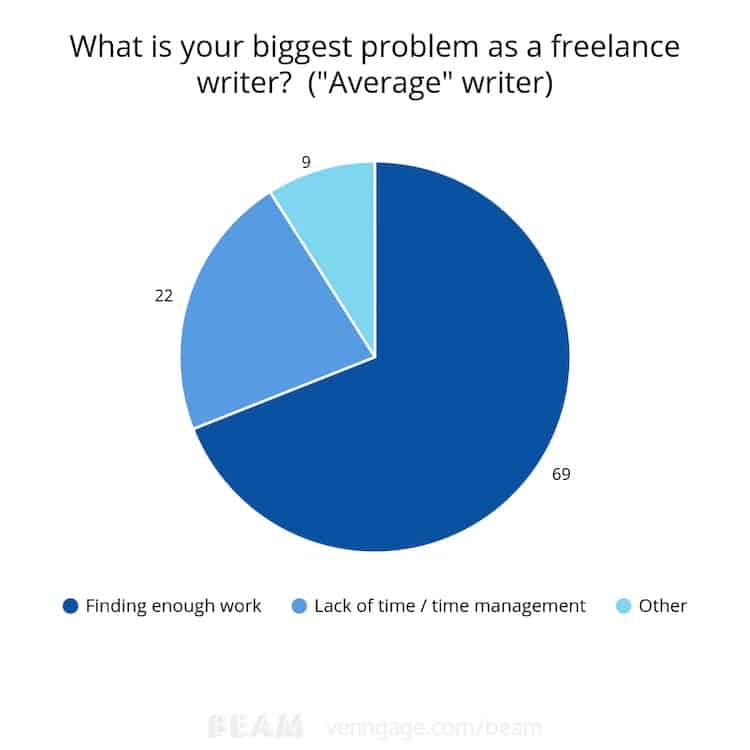
Another survey found that “high earners”—defined as writers who make more than $45 per hour—generate most of their income from their network and referrals.
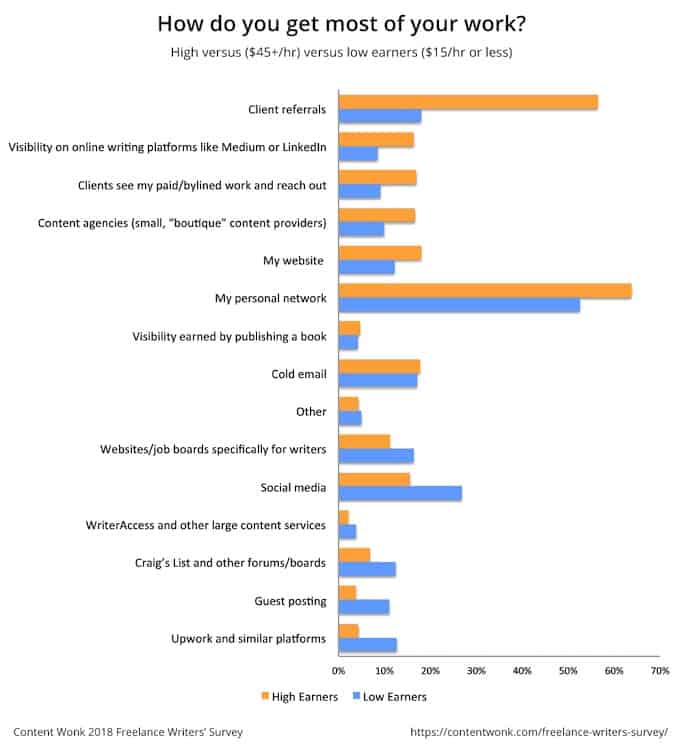
Unsurprisingly, high earners also indicated that their income comes mostly from recurring work.
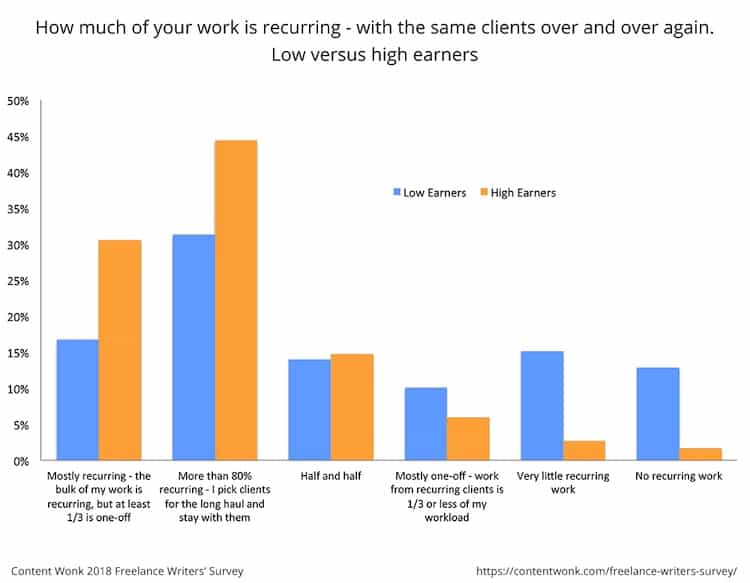
If you want to get more client work, then these surveys show that your goal is to:
- Build a network.
- Charge recurring fees—think a monthly retainer, packages, or discounting for long-term work.
If most of your income comes from one-time gigs and freelance marketplaces, then you need to change your strategy.
Ideally, you want to have your own writing portfolio which you use to attract leads. In other words, you want to develop an inbound marketing strategy. But doing so takes time. Six months to a year, at the minimum.
In the short-term, you want to develop a more aggressive system that gets you closer to your clients.
Forget about freelance marketplaces. They are great for starters, but if you want to up your income and work with better clients, you need to change your strategy.
How does the saying go? “When life gives you lemons, you make lemonade.”
Well, if you aren’t getting any good clients, go out and start getting some.
Here’s how you do it.
Solution: Build an Outbound Marketing System
By outbound marketing system, I mean pitching dozens of potential clients every week.
- It’s a system because it takes multiple steps that are interconnected.
- It’s marketing because your goal is to attract leads (i.e., potential clients).
- It’s outbound because you are the one getting the leads.
Call it “cold pitching,” “email outreach,” or “shameless promotion.”
The point is, you have to go out and knock (figurative) doors until one opens.
That’s why I did when I started, and it worked. Sending emails to editors and marketing managers allowed me to get top software companies and charge over $250 per article—and that’s just when I was starting (!).
All freelancers have to send cold pitches at some point in their careers. And it’s what separates the ones who can build an income in the early stages of their careers from those who rely on cheap marketplace clients.
It’s tough. It requires a lot of patience. And practice. And humility.
But it works.
How do you make it work?
By pitch people who need your services.
That’s your job.
And how do you do actually do that?
By pitching sites that work with freelance writers.
This simple fact will narrow your list of prospects significantly. You may leave a lot of potential companies aside, but right now, we’re playing on safe ground. You want to pitch companies that you know are willing to work with you.
So how do you find sites that work with freelance writers like yourself?
Through a technique famously known as reverse engineering.
Reverse engineering is a fancy way of saying that you look for writers in your industry who already work for clients. Then you pitch those companies or their competitors.
Here’s how to do it:
Find Writing Opportunities Through Reverse Engineering
Start by using a broad search query like:
[NICHE] + freelance writer
In niche, you put the niche where you work in. Use a broad keyword, like:
- SaaS
- B2B
- Marketing
- Travel
- Finance
- Legal
- Healthcare
If I was in the healthcare niche, here’s what I’d get:
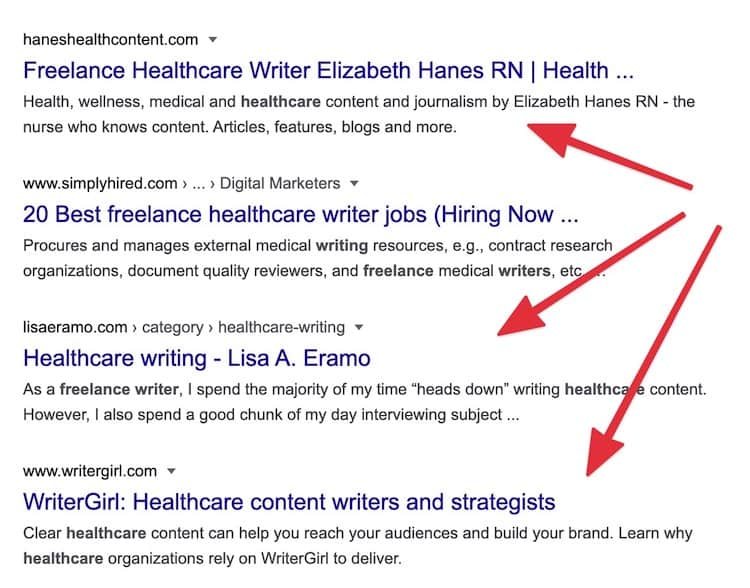
Make a list of all the sites you wind for the 100 search results. (Here’s a little trick to have all the 100 results on one page.)
Then, visit each of the sites you find and check their writing portfolio.
One of the writers has a long list of all the sites she’s written in:
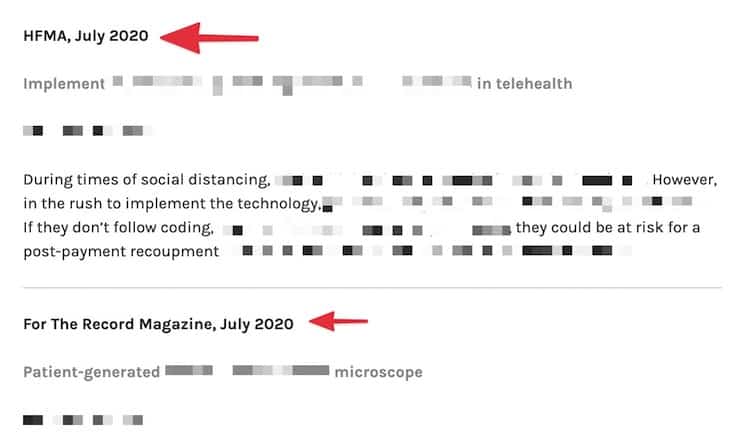
Repeat this process with all the writers on your list.
Make a list with every writer you find.
Then, look for the author page in each of the sites they have written. This will help you in our next step, so make sure you do it for every writer and every website they have written in.
Once you finish your research, you need to separate the wheat from the chaff.
Or, in other words, the paid commissions from the guest posts.
Isn’t This Unethical?
I know you must be thinking, “but Ivan, you are stealing these people’s jobs! That’s not cool!”
First of all, calm down, Donald Jr. No one is stealing anyone’s job here.
All you want to do is find sites that hire freelance writers. In many cases, the people you will be researching already stopped working for those sites.
And if these writers continue to work for the sites you will pitch to, what’s the problem? You won’t trash-talk these writers. You just want to get a job on the same site they are working in.
Qualify
In this step, you want to check each site where every writer has published in and delete those sites where the writer published as a guest—who are mostly unpaid—and keep those where the writer publishes regularly.
Understand this: freelance writers often add sites in their portfolios where they write for free, just to get some “proof” of authority.
I do this too. Check my portfolio. Over 50% of the sites there weren’t paid. But they help to build authority in my industry.
Your job is to delete those that weren’t paid and keep those that were.
Qualifying websites for this purpose requires some practice to get right. You will be fooled to think that some sites pay their writers when they don’t. After some time, you will develop an intuition that will help you see quickly when a website works with paid freelancers.
Here’s the qualification process summarized:
- Go to the author page each writer in your list and check the number of articles they published.
- Then, read their bio.
- Segment the results:
- If the writer published one article over two months ago, or if it was written in representation of a company, it was likely a (free) guest post.
- If they write regularly on the site and they are representing themselves, you may have found gold.
- Repeat the process in half a dozen recent articles recently published from other writers.
- Check for the two criteria mentioned before. The more freelance writers who publish often and that represent themselves, it’s likely the site works with paid freelance writers.
(You also want to search for a “write for us” page. Many sites pay for their guest writers, even if it’s a one-time job. Still, remember that your job is to get clients for the long-term.)
Let’s take an example from a freelance writer in the finance industry.
My search quickly led me to this freelancer’s site:

I clicked on the site and searched for his portfolio.

There, I had a long list of sites, most of which belong to large insurance and financial institutions. I don’t have any experience pitching these types of companies, so I will look for blogs from non-financial institutions.
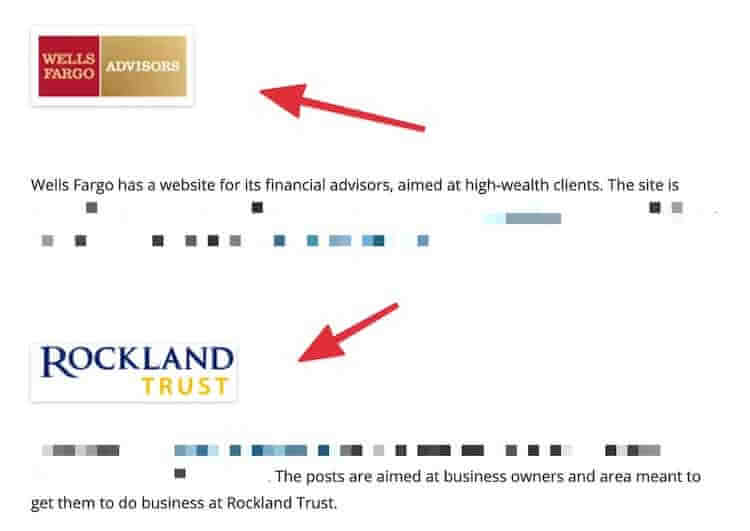
Soon after, I found Daily Finance and Wise Bread, two sites that are likely to hire freelance writers.
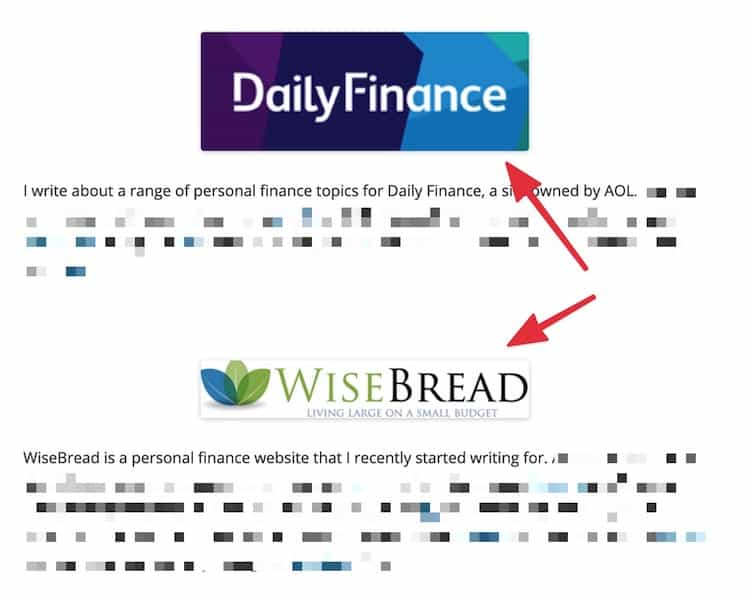
As I said before, my job is now to see whether the freelancer wrote for himself and whether he’s written more than one article.
The results are non-conclusive. On the one hand, he doesn’t have a bio author. And the articles were published a few years ago. On the other, he’s written extensively for the site.
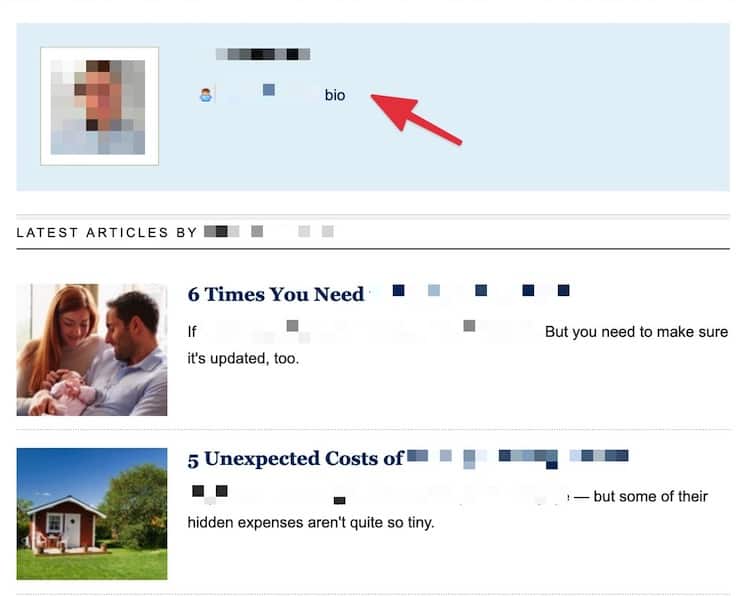
There are more than a dozen results in this guy’s author page.
Since I can’t be sure whether Wise Bread hires freelance writers or not, I need to explore further.
After I clicked a dozen articles that I found on the homepage, I found one writer who’s a contributor:

While her latest article was over six months old after I found it, it was a good sign.
Her author page shows dozens of articles published in the past few years, another great sign.
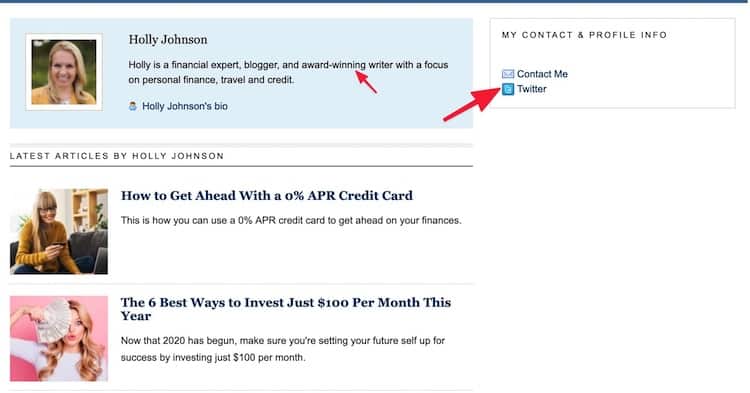
But she doesn’t mention anything on freelance writing. So I checked her Twitter page. And then, I found the two words I was looking for:

She’s a freelance writer! 🎉
Just to be sure, I checked a few other articles in Wise Bread and looked for other freelance writers.
And I found this one:

And this one:

I can’t be sure that Wise Bread continues to hire freelance writers. The site seems a bit outdated.
But, unlike the most common tactic where you send emails to anyone with an email address, this tactic will help you find more valuable opportunities.
Look for Editors and Find Their Email
Now you need to find the editor, or whoever is in charge of the blog, and find their email address.
In the case of Wise Bread, this step was easy.
First, I clicked on the “Contact” button on the top menu.

And then, I found this:

All you have to do then is follow the instructions, and you are done.
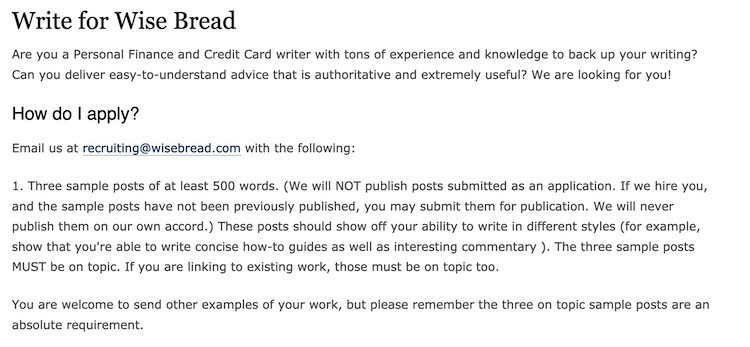
If you can’t seem to find who’s in charge, you have two options:
- Check the about page for an editor or marketing manager.
- Look on the company’s LinkedIn page for the same position.
Once you find a name—which, again, can be anything related to marketing, not just editing—plug in the website address in Hunter.
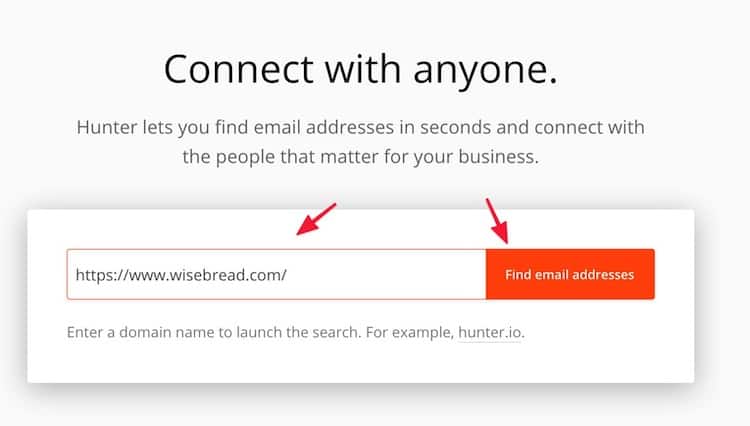
Then, add the name in the search bar, as shown below, and see what results you get.
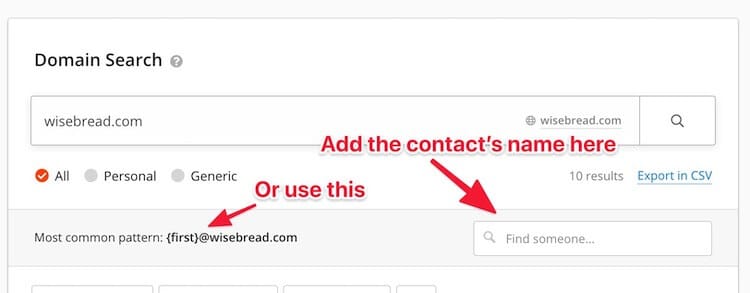
Repeat the same process for all the companies you have on your list.
Prepare Your Pitch
There are hundreds of guides that share pitches for freelance writers. At first, you can rely on these templates.
Ideally, you want to develop your own pitch template. Otherwise, you risk sending an email others have sent before, something that makes you look quite obnoxious.
I’ve talked about the emails I sent before in my guide on becoming a freelance writer. I highly recommend you check it out.
Here’s where most freelancers—including my past self—finish their outbound marketing efforts.
But as the old infomercials used to say, “wait, there’s more!”
If you want to separate yourself from the rest, you want to professionalize your service.
By this, I mean you don’t just pitch people asking them if they want a writer. You can get some clients, for sure, but it will be hard to command high rates.
Most importantly, it will be hard to build a recurring income.
One mentor of mine, Jacob McMillen, has shared a system he used for acquiring and closing clients through cold email pitching.
Here’s how it looks like:
- Send out 20 pitches per week.
- Identify how you make your clients’ money.
- Package your service.
- Upsell a recurring service.
- Ask for referrals.
Overall, this system will help you develop a pace for acquiring clients. You need to keep it up until you get at least three clients—or until you hit a revenue level that you are comfortable with.
What’s more, this system will help you expand your network thanks to the two key attributes of high earners—as shown before:
- You generate recurring income.
- You get referral work.
If you want to learn how the whole process works, please check Jacob’s article:
5 Steps To Double Your Freelance Income In The Next 30 Days
I Don’t Know What to Write About
🎁 Do you struggle with your creativity? All you need to do is serve your readers. Download this 12-page PDF where you will learn how to find unlimited ideas to write about.
I Don’t Know How to Charge Good Rates
Every day, you sit down, put down your coffee mug, and you open your computer.
You start working early in the morning.
Noon comes and you stop to eat lunch.
Then you prepare another cup of coffee, and you keep working.
The sun goes down, and you close your computer.
You are tired; you worked for six, eight, maybe ten hours non-stop.
You answered emails from your clients. You wrote an article for one of them. Maybe two. You even edited one that you finished last week and that you need to send it to another client ASAP.
You put in the work, I’ll give you that.
But by the end of the month, the paycheck doesn’t cover your lifestyle. You barely break even, if you can even do so.
The problem isn’t that you don’t work enough; it’s that you don’t charge enough.
I get it: in an era of globalized competition, a client can always find someone willing to work for less. All they have to do is search in Upwork, and they are done.
You are aware of this, and it scares you. You are afraid that if you command higher rates, you will lose your clients.
How can you break free and charge what you are worth?
Solution: Write Like a Business
Earlier, I said that if you want to pitch successfully to potential clients, you need to “pitch someone who needs your services.”
Why did I say that?
It’s because I think like a business owner.
Do you see I didn’t say “freelance writer”? I said business owner.
Yes, I love writing. I love the freedom freelancing gives me. But thinking and acting like a craftsperson alone won’t get me far in this business.
Think of yourself as a business owner, and you will change the way you run your business.
Your price per word, article, or project isn’t set in stone. The “market” doesn’t set it up for you.
When you write like a business owner, your rates are an extension of the value you provide to your clients.
You are not in the writing industry; you are in the B2B industry.
You happen to write for businesses, but that’s all.
What’s more, your content is marketing. Sad as it may seem for those who dislike the idea of marketing, the content you write will always be used as a channel for a marketing message—educating customers, building a brand, attracting visitors, closing leads, etc.
Those writers who fail to grasp this crucial point, end up failing to create high-quality content and serving their clients and their readers.
Chris Gillespie, the founder of Fenwick, a writing studio for B2B startups, explains this crucial point when he said:
The reason a lot of consumer writers are repelled from these shores is they don’t have an abiding curiosity about how businesses work. They alienate readers by elaborating on elementary topics that everyone else already gets and give bad advice like some sort of business consultant from Mars, saying things no person in that sector would actually say.
This means, thinking in terms of writing alone, indistinct of the purpose your skills serve, ends up alienating the readers. Your content will not align with what they want. Therefore, your clients won’t work with you anymore.
But if you step up and write like a business person, you will be able to play the stakes as you should.
You have a latent value, whether you have realized it or not. To uncover it, I have to repeat the same advice I have previously: pick a side.
You can’t be a “writer;” you can be a “B2B writer who specializes in developing educational content for professional marketers.”
(That’s my value, by the way. That’s who I am and what I do.)
Ever since I started working as a professional writer, I picked a side. And it made all the difference in the world.
Does it mean you can’t write for different industries? Sure, you can. But I find it much easier to specialize than to serve different industries.
After you pick a side, the rest will be much easier.
- Does a client haggle over your prices? You dismiss them.
- Do you never get a complaint about your prices? You raise them.
- Do you doubt yourself when you pitch your prices to your clients? Remember who you work with and the money they can generate thanks to your content.
Writing rates are never set in stone. Only a click separates you from people ready to charge less than you. But who cares about that?
As Chris Gillespie explains (emphasis mine):
It’s difficult to charge what you’re worth when you first start out. On the one hand, you see others accepting mere cents per word on freelancing sites and on the other, it seems like every writer with a website has made six figures and wants to sell you a course on doing the same. The trick is ignoring all of this. Pick a rate, pick a niche, and hold firm. Anyone who balks at that rate is a poor fit. Tie yourself to the mast like Odysseus and ignore their siren wails. Eventually, you’re going to meet a client who appreciates good writing and is worth ten of the others.
When you think like a business person, your content will appreciate immediately. Your clients will increase their quality. Your job satisfaction and productivity will increase.
Remember to pick a side and stand firm. The rest will take care of itself.
Overcome Your Writing Challenges
The life of a freelance writer is surrounded by challenges. There’s no way to escape it.
My goal was to show you three writing struggles I have faced over the years, and that others have reported facing too.
You will be challenged.
What matters is that you are prepared to stand up and face the challenge upfront.
The more you prepare yourself, the easier it will be to overcome it.
